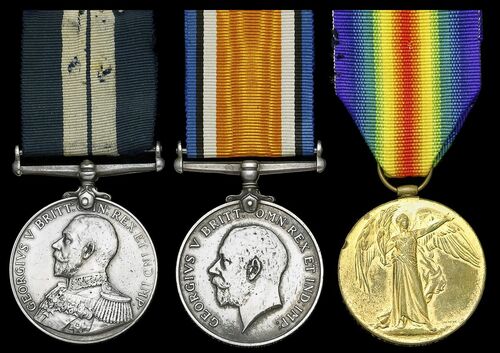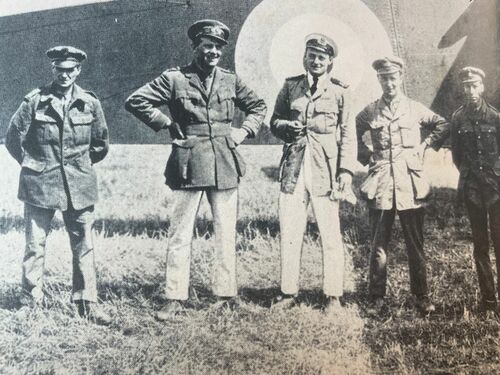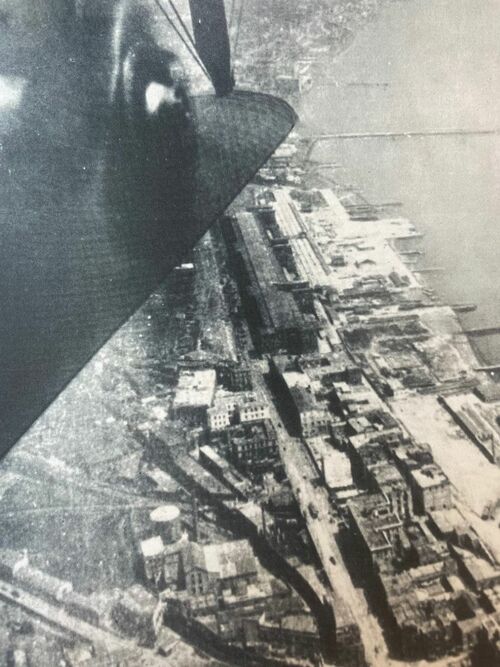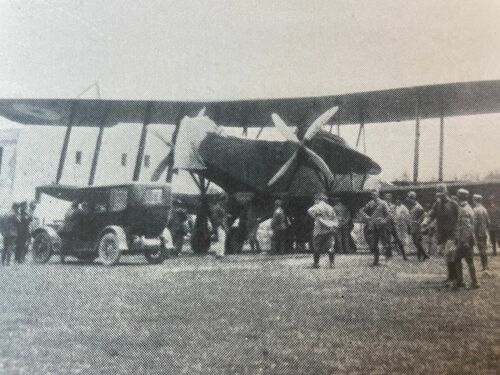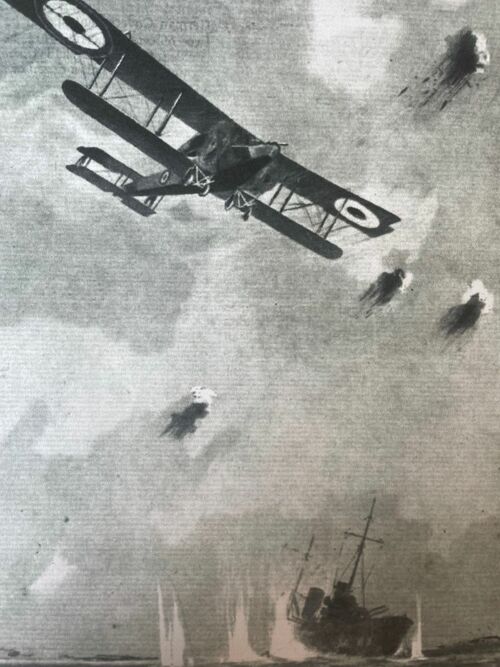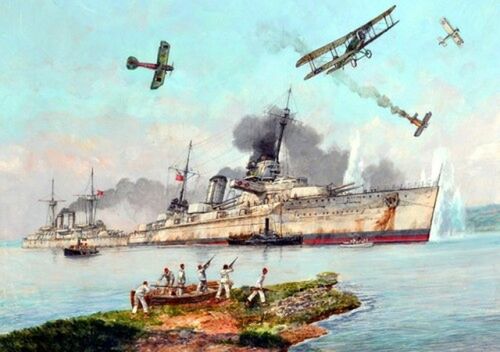Auction: 23002 - Orders, Decorations and Medals
Lot: 85
A rare Great War Handley Page crew member’s D.S.M. group of three awarded to Sergeant B. Cromack, Royal Air Force, late Royal Naval Air Service, who, having participated in a record flight from Manston to Mudros, was present in the attack against the Goeben and Turkish War Office at Constantinople in July 1917 - an event which resulted in their sinking the largest ship, by air, during the Great War
Distinguished Service Medal, G.V.R. (F. 9156 B. Cromack, Lg. Mechn., R.N.A.S., Mudros, 9 July 1917); British War Medal 1914-20 (209156 Sgt. B. Cormack, R.A.F.), note surname spelling; Victory Medal 1914-19 (209156 Sgt. B. Cromack, R.A.F.), the rank ‘Sgt.’ partially tooled out, contact marks, generally very fine (3)
D.S.M. London Gazette 31 August 1917. The original Recommendation (AIR1/649/17/122/602) states:
'For the Air Raid on Constantinople including SMS Goeben 9 July 1917, in RNAS Handley Page 0/100 No. 3124. This rating (with Chief Petty Officer J. L. Adams) accompanied the machine from Hendon to Mudros and were largely responsible by their unremitting care for the good performance of the machine. The former German battle cruiser Goeben (now the Turkish ship Yavuz Sultan Selim) was found surrounded by smaller craft including submarines and destroyers, undergoing repairs in Stenia Bay. The Handley Page attacked the Goeben from 800ft, but although it appeared at the time that some of the eight 112lb bombs dropped hit the battle cruiser, little damage was done. Hits were made on the destroyer Yadigar-i-Millet, and an explosion and fire followed which sank the ship. The Handley Page then flew to the upper waters of the Golden Horn and dropped two bombs on the SS General which was apparently the German HQ, and afterwards attacked the Turkish War Office with the last two bombs, though little damage was done. The Handley Page arrived safely back at Mudros at 0340hrs.'
Benjamin Cromack was born in Bradford, Yorkshire, in July 1894. A sheet metal worker by trade, he enlisted in the Royal Naval Air Service as an Air Mechanic 1st Class in November 1915, and initially served at R.N.A.S. Hendon and Manston, gaining advancement to Leading Mechanic at the end of 1916.
It was in this latter capacity, in late May 1917, that he was selected to join the Handley Page 0/100 crew of Flight Lieutenant Kenneth Savory D.S.O. - no ordinary appointment, for said aircraft and crew were charged with undertaking a record flight from Manston to Mudros, a remarkable feat successfully accomplished after a journey of some 2,000 miles via Paris, Lyons, Frejos, Genoa, Rome (where the crew were horrified by the publicity their flight had attracted, in fear of the element of surprise being lost), Naples and Otranto.
Once settled in Mudros, Savory set about planning a strike against the Goeben at Constantinople, having already accomplished a similar attack - for which he was awarded the D.S.O. - in April 1916.
Squadron-Commander Savory brought HP 3124 over the target area shortly before midnight, setting course for Stenia Bay where the Goeben lay at anchor with other enemy ships and submarines. The element of surprise seemed total, three runs around the bay going unchallenged while captain and crew assured themselves of the target. Then Savory swept in at 800 feet and at the appointed moment McClelland released a salvo of four 112lb bombs, all of which fell just amidships of the Goeben, damaging surrounding enemy shipping. The second salvo of four 112lb bombs, released a few minutes later, appeared to hit her in the centre of her forward deck. Now the fireworks had started, an appreciable amount of A.A. fire started to light up the night sky. Unperturbed, the gallant crew of HP 3124 set off West to attack the General, a ship which was thought to house a German H.Q. It was 12.20 a.m. when McClelland dropped a pair of 112lb bombs bang on to her stern from 1,300 feet. Final port of call was the Turkish War Office where, from 900 feet, they appeared to score two direct hits in the centre of the building. Well content with the night's work, Savory turned the giant Handley Page for home, having, by twentieth century standards, accomplished a feat no less outstanding than that achieved by the Vulcan bomber raid on Port Stanley airfield during the Falklands War.
The success of the raid will never be fully known, there being so many conflicting accounts. It would seem, however, that damage to the Goeben was minimal, although one of our agents claimed 29 had been killed. The enemy did admit the loss of one of the submarines which had been tied up alongside the battleship, in addition to other damage. Whatever the physical cost to the Turks and Germans, one thing was clear: Squadron-Commander Savory and his crew had completed an epic raid which must have hit at the very heart of enemy morale. Indeed the Admiralty was quick to release a glowing communiqué describing their accomplishment and in August the London Gazette announced the award of the D.S.O. to Savory, the D.S.C. to McClelland and Rawlings, and the D.S.M. to Adams and Cromack; it is interesting to note, too, that the crew of HP 3124 were later awarded a bounty for the sinking of the Turkish destroyer Yadighiar-i-Milet on the same occasion. The full story of their gallant exploits appears in Keble Chatterton’s Seas of Adventure.
Returning home, Cromack served in Dunkirk from October 1917-March 1918, much of that time in ‘A’ Naval Squadron, and latterly as a Sergeant Mechanic in the newly established Royal Air Force. He was demobilised in early 1919.
Between the Wars, Cromack was winner of the Bradford to London Motorcycle and Sidecar Race; sold together with copied service papers.
Subject to 20% VAT on Buyer’s Premium. For more information please view Terms and Conditions for Buyers.
Sold for
£2,800
Starting price
£2800

